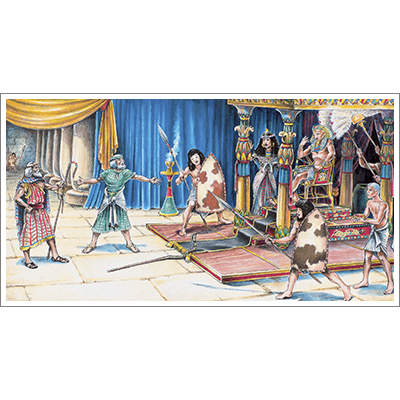God is able and willing to deliver us no matter what challenges we face. At times challenges can seem overwhelming by our five senses. We do not allow what we perceive with our senses to discourage us, but believe God’s Word to receive His deliverance. God has lovingly provided us with many records in His Word to remind us that He is able and willing to deliver. One of my favorites is a record in the Old Testament.
The Book of Exodus describes how the children of Israel were in bondage under Pharaoh, the king of Egypt, who forced them to build his treasure cities. They became abject slaves in what was then the most powerful nation in the world and had no visible means to attain freedom or even improve their circumstances. The challenge they faced looked insurmountable and overwhelming. But the children of Israel cried to God for deliverance, and God sent Moses and Aaron in answer to their cry.
Exodus 5:1:
And afterward Moses and Aaron went in, and told Pharaoh, Thus saith the Lord God of Israel, Let my people go, that they may hold a feast unto me in the wilderness.
Moses and Aaron spoke God’s Word to Pharaoh to proclaim the deliverance God promised for the children of Israel and to give Pharaoh the opportunity to believe God’s Word.
Exodus 5:4 and 5:
And the king of Egypt said unto them, Wherefore do ye, Moses and Aaron, let [hinder] the people [the Israelites] from their works? get you unto your burdens.
And Pharaoh said, Behold, the people of the land now are many, and ye make them rest from their burdens.
Pharaoh responded to God’s Word with scorn and defiance. He accused Moses and Aaron of hindering the Israelites from the works he had commanded for them—burdens which he thought were much more important than holding a feast unto God in the wilderness.
Exodus 5:6-8:
And Pharaoh commanded the same day the taskmasters of the people, and their officers, saying,
Ye shall no more give the people straw to make brick, as heretofore: let them go and gather straw for themselves.
And the tale [number] of the bricks, which they did make heretofore, ye shall lay upon them; ye shall not diminish ought thereof: for they be idle; therefore they cry, saying, Let us go and sacrifice to our God.
Pharaoh refused to believe God’s Word and instead worked to make the challenge that God’s people faced even more overwhelming. He commanded more labor and harder labor for the Israelites and accused them of being idle—of shirking the work Pharaoh appointed. He ordered more work so they wouldn’t have time to think about worshiping their God. Pharaoh’s reprimand continues in Exodus 5:9:
Let there more work be laid upon the men, that they may labour therein; and let them not regard vain words.
“Vain” is the Hebrew word sheqer, which means “deceitful, false, lying.” Pharaoh said the words from God that Moses and Aaron spoke were deceitful, false, lying words—words that would not come to pass and bring deliverance. Pharaoh backed up his words with even more crushing oppression for the Israelites. The adversary, the Devil, whose objective is always to steal, kill, and destroy, was working through Pharaoh to try to discourage those who were believing God for deliverance. But Moses did not allow what looked like overwhelming circumstances to overwhelm him. He went to God for answers. Moses poured out his heart to God.
Exodus 5:22 and 23:
And Moses returned unto the Lord, and said, Lord, wherefore hast thou so evil entreated this people [idiom of permission: allowed this people to be so evil entreated]? why is it that thou hast sent me?
For since I came to Pharaoh to speak in thy name, he hath done evil to this people; neither hast thou delivered thy people at all.
In the midst of these circumstances of seeming despair and defeat came words from God to Moses.
Exodus 6:2 and 3:
And God spake unto Moses, and said unto him, I am the Lord [Jehovah]:
And I appeared unto Abraham, unto Isaac, and unto Jacob, by the name of God Almighty, but by my name JEHOVAH was I not known to them.
Moses and the descendants of Abraham, the Israelites, would soon know God by His name “Jehovah.” One way God describes Himself in His Word is through the names He gives Himself. “Jehovah” is the name God uses to describe His relationship to what He created. What was God’s relationship to His people at that time?
Exodus 6:4 and 5:
And I have also established my covenant with them, to give them the land of Canaan, the land of their pilgrimage, wherein they were strangers.
And I have also heard the groaning of the children of Israel, whom the Egyptians keep in bondage; and I have remembered my covenant.
Jehovah’s relationship to the children of Israel was a covenant relationship. God had made a covenant with Abraham, whose offspring were the children of Israel, and His covenant was to give Israel the land of Canaan. Here in this crushingly oppressive situation God reminded Moses that His covenant was established—that it would stand firm, it would continue. God was still able and willing to uphold its terms….
This is an excerpt from the July/August 2008 issue of The Way Magazine.
Copyright© 2008 by The Way International. All rights reserved.
For more information on subscribing to The Way Magazine, Click Here

